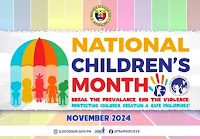Empowering Women’s Rights
National Women's Month, celebrated annually in March, honors women's contributions, achievements and progress toward equality. This commemoration serves as a reminder of the ongoing struggle for women's rights and empowerment.
 Throughout history, women have faced discrimination, marginalization and oppression. Despite these challenges, women have consistently demonstrated resilience, determination and leadership. From suffragettes fighting for voting rights to activists advocating for reproductive freedom, women have pushed boundaries and challenged societal norms.
Throughout history, women have faced discrimination, marginalization and oppression. Despite these challenges, women have consistently demonstrated resilience, determination and leadership. From suffragettes fighting for voting rights to activists advocating for reproductive freedom, women have pushed boundaries and challenged societal norms.Today, women continue to break barriers in various fields, including science, technology, engineering and mathematics (STEM), politics, arts and entertainment. Their accomplishments inspire future generations, fostering a culture of inclusivity and equality.
However, disparities persist. Women still face pay gaps, limited representation in leadership positions and systemic violence. National Women's Month emphasizes the urgency of addressing these issues.
*Laws Protecting Women's Rights*
1. *The Violence Against Women Act (VAWA) of 1994 (U.S.)*: This landmark legislation provides protections for victims of domestic violence, dating violence, sexual assault and stalking. VAWA established grants for services, training and education, and created a national hotline for victims. Key provisions include:
- Emergency shelter and counseling services
- Protection orders and enforcement
- Funding for training law enforcement and court officials
2. *The Equal Pay Act of 1963 (U.S.)*: This law prohibits sex-based wage discrimination, ensuring women receive equal pay for equal work. Key provisions include:
- Prohibiting pay disparities based on sex
- Requiring equal benefits and working conditions
- Allowing victims to file lawsuits for back pay and damages
In conclusion, National Women's Month 2024 celebrates progress toward gender equality while acknowledging ongoing challenges. Laws like VAWA and the Equal Pay Act demonstrate significant strides in protecting women's rights. Continued advocacy and action are essential for achieving true equality and empowering women to reach their full potential.







